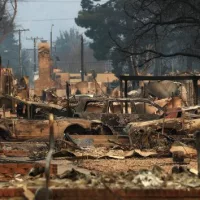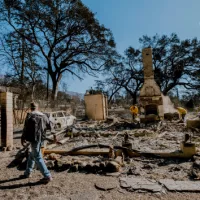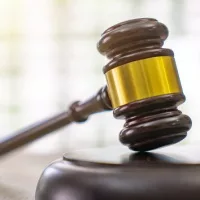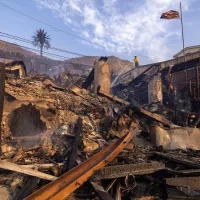
Breonna Taylor Family(LOUISVILLE, Kentucky) — BY: CHRISTINA CERREGA and SABINA GHEBREMEDHIN
It has been more than three months since Breonna Shaquille Taylor was gunned down in a hail of bullets by Louisville, Kentucky, police officers who were executing a “no-knock” warrant.
At least three different law enforcement agencies in the state have launched parallel investigations into Taylor’s death.
The three officers involved remain on administrative reassignment as Taylor’s family struggles to move on.
“I haven’t had time to sit and grieve,” Taylor’s mother, Tamika Palmer, told “Nightline” on June 11. “I’m still trying to figure out why my daughter was killed. I’m still trying to figure out, why did it have to come to her being murdered. Why did Breonna have to die?”
As the weeks have passed by, the demands for answers have joined the calls for justice for the dozens of other African American men and women killed at the hands of police.
Here’s how the investigation into Taylor’s death has unfolded:
March 12
Louisville Metro Police Department Detective Joshua Jaynes files a request for a “no-knock” search warrant of Breonna Taylor’s home after investigating the activities of Jamarcus Glover, who was a known to the police as a drug trafficker, according to the warrant.
Glover is Taylor’s ex-boyfriend who, according to police, was using her address to mail drugs through the post office. Police note in the arrest warrant request that they verified with postal inspectors that Glover was receiving packages at Taylor’s address.
The “no-knock” warrant is requested “due to the nature of how these drug traffickers operate. These drug traffickers have a history of attempting to destroy evidence, have cameras on the location that compromise Detectives once an approach to the dwelling is made, and a have history of fleeing from law enforcement,” according to the court document.
March 13
Minutes after midnight, as Breonna Taylor and her boyfriend Kenneth Walker are asleep inside their ground-floor apartment at the St. Anthony Gardens on Springfield Drive, there are knocks on the front door.
Plainclothes Louisville Metro Police Department Officers Myles Cosgrove and Brett Hankison, and Sgt. Jonathan Mattingly, use a battering ram to force open the green door with a gold No. 4 hanging on it, at which point police say they are met with a gunshot that strikes Mattingly in the thigh.
The three officers blindly return fire with more than 25 bullets — some entering other apartments, including one with a 5-year-old child.
Walker, a licensed gun owner with no criminal record, calls 911 tearfully pleading for help as he thinks a home invasion is in progress.
“Somebody kicked in the door, shot my girlfriend,” says Walker to the 911 dispatcher.
Taylor, 25, is fatally struck by at least eight bullets.
Walker surrenders and is taken into custody on charges of attempted murder of a police officer.
Cosgrove, Hankison and Mattingly are placed on administrative reassignment until the Louisville Metro Police Department’s Public Integrity Unit completes its investigation.
Police find no drugs inside Taylor’s apartment.
March 20
Taylor’s family and friends travel a few miles away to Spring Valley Funeral Home in New Albany, Indiana, for her wake.
Taylor, born in Grand Rapids, Michigan, where she was raised by her mother, is remembered as “full of life … and all it had to offer,” according to her obituary. She had left home to attend the University of Kentucky before going to become a licensed EMT for the city of Louisville, where she worked on the front lines during the early stages of the coronavirus pandemic.
Funeral services are held the following day at Greater Friendship Baptist Church in Louisville.
March 26
Louisville judge Olu Stevens agrees to release Walker from jail and into home confinement in order to keep the jail population low as a preventative measure against the spread of the coronavirus.
Louisville police union president Ryan Nichols says the judge’s decision to release Walker is a “slap in the face to everyone wearing a badge” and has endangered the public.
April 27
Attorneys Sam Aguiar and Lonita Baker file a wrongful death lawsuit in Jefferson District Court against Officers Cosgrove and Hankison and Sgt. Mattingly on behalf of Breonna Taylor’s mother, Tamika Palmer.
“The Plaintiff brings this personal injury and wrongful death action in order to obtain damages resultant from the Defendants’ unlawful conduct, which directly and proximately caused the death of a young, beautiful human being who was also an essential front-line medical professional in this community,” according to the lawsuit.
May 15
Louisville Postal Inspector Tony Gooden says that his office was not a part of an inspection of possible drug trafficking activity in packages delivered to Breonna Taylor’s address.
Civil rights attorney Ben Crump says that “directly contradicts what the police stated in the affidavit to secure a no-knock warrant for the home.”
“This revelation validates what we already knew: This young woman was brutally and unjustifiably killed by Louisville police, who supplied false information on the warrant they used to enter her home unannounced. Gooden further stated that ‘no packages of interest were going there,'” says Crump.
May 22
Commonwealth Attorney Tom Wine announces that the charges against Kenneth Walker have been temporarily dismissed as the FBI, Department of Justice and Kentucky attorney general open their own investigation into Taylor’s death.
“While dismissing the charges is the right thing to do, it comes more than two months after Breonna was killed and Kenneth was arrested. Louisville police spent these months defending their actions and smearing Kenneth’s and Breonna’s good names. This is just another step to the [Louisville Metro Police Department] taking full responsibility for its actions,” says Crump.
June 5
In honor of what would have been Taylor’s 26th birthday, writer Cate Young launches an online campaign as a call to action in support of Taylor.
Among other steps, the nine-part plan encourages supporters to use the hashtags “#SayHerName” and “#BirthdayforBreonna” on social media and to send a birthday card to Kentucky’s Governor Daniel Cameron demanding charges be filed against the officers.
June 11
The Louisville, Kentucky, Metro Council unanimously passes Breonna’s Law.
The new law outlaws “no-knock” warrants and requires body cameras be turned on before and after every search.
Copyright © 2020, ABC Audio. All rights reserved.















